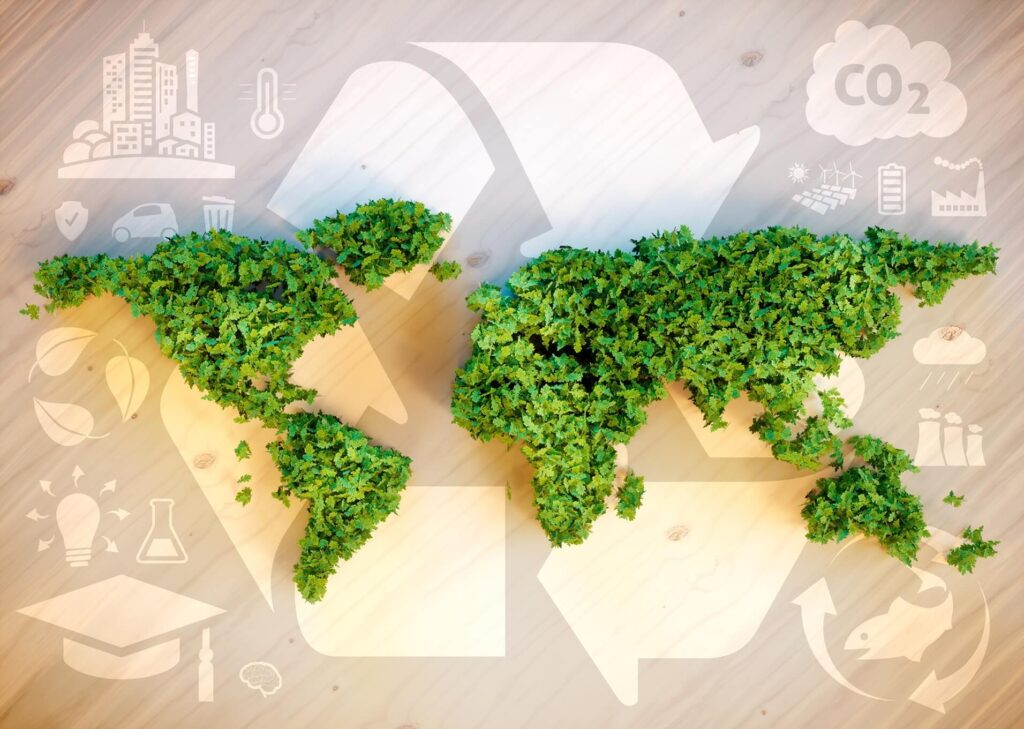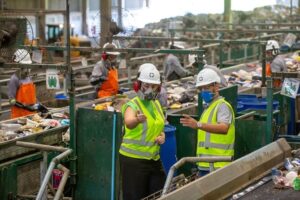
The carbon footprint is an environmental indicator that measures the amount of greenhouse gases (GHG) emitted by individuals, companies, cities, or countries. This facilitates the understanding of where and how to reduce and offset the carbon footprint, helping in the fight against climate change.
The calculation of the Carbon Footprint considers GHG emissions throughout the entire life cycle (production, consumption, and disposal) of the products used by a person or institution.
This way, it is possible to make choices considering a lower carbon footprint. For example, choosing food produced closer to where it will be consumed, thus avoiding significant emissions during transportation.
How to reduce a company’s carbon footprint
For a company to reduce its carbon footprint, it is important to identify the main critical emission points in its operation, so that it can then plan with its team, service providers, and suppliers for less polluting alternatives.
Some key areas of attention in corporate GHG emissions:
- Transportation:
- Encourage and facilitate the use of bicycles, public transportation, or carpooling.
- Prefer suppliers located closer to your company.
- Choose a fleet that uses renewable fuels, such as biofuels.
- Energy:
- Prioritize biofuels and clean energy sources.
- Invest in renewable energy sources such as biogas, solar, wind, or hydroelectric power.
- Perform regular maintenance on equipment to reduce energy consumption.
- Waste management:
- Create an environment with fewer disposable items, for example, replacing plastic cups with individual bottles.
- Separate recyclable waste.
- Send organic waste for composting.
- Implement reverse logistics initiatives.
- Product and Raw Materials:
- Choose suppliers with social and environmental responsibility.
- Select raw materials that are more natural, biodegradable, or recyclable.
- Use more recycled materials in products.
- Acquire recycling credits.
- Other actions:
- Participate in environmental support projects.
- Promote environmental awareness among employees.
Carbon Credit Purchase
Companies wishing to offset the carbon from their operations, in order to minimize environmental impact and comply with international sustainability goals, can do so through carbon credits.
Carbon credits are certificates representing the reduction of one ton of CO₂ equivalent avoided in the atmosphere.
They allow companies that cannot reduce their emissions to offset their footprint by supporting sustainable projects — such as reforestation, green area protection, or waste management with biogas capture.
In Brazil, the carbon credit market was officially regulated by Law No. 15,042 of December 11, 2024.
Now, with the application of the law, we have two types of compensation:
- Regulated Market: for companies required to offset their emissions, such as fossil fuel distributors.
- Voluntary Market: businesses that want to offset due to their environmental commitments and goals.
The purchase can be negotiated through specialized platforms or directly with the project that generated the carbon credits.
In any case, it is essential that the credit comes from a project certified by a trusted entity, such as:
- Gold Standard Verra (VCS – Verified Carbon Standard)
- CDM (Clean Development Mechanism – UN)
- ABNT + Instituto Totum (for the Brazilian market)
After the purchase, the company receives a compensation certificate, which proves the acquisition of the credits and can be used in ESG reports, carbon neutrality targets, and sustainable marketing.
Carbon Credits from Waste: A Smart and Circular Solution
Today, innovative companies are changing the role of waste in our society. What was once merely an environmental issue has become an opportunity to generate clean energy, organic fertilizers, recyclables, biofuels, and also contribute to the global climate agenda.
A concrete example is the work of Orizon, which provides waste valorization solutions. The company captures biogas produced in landfills and transforms it into biomethane or electricity, preventing this gas from being released into the atmosphere and harming the climate.
This activity not only avoids emissions but also generates certified carbon credits through international mechanisms such as the Gold Standard, which can be acquired by companies aiming to reduce their carbon footprint.
The Impact of Waste-Based Carbon Offsetting
Carbon projects generated through proper waste management also promote:
- Local development and job creation.
- Renewable energy from biogas.
- Pollution reduction.
- Social inclusion of nearby communities
In a world where the climate emergency demands immediate and concrete responses, carbon offsetting through waste management is an accessible, efficient solution with direct impact. Investing in this path means caring for the planet while promoting innovation, inclusion, and sustainability.



